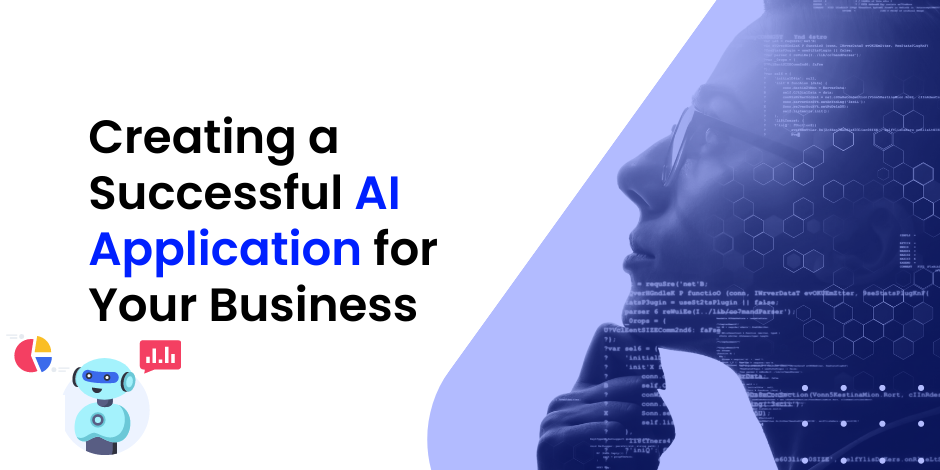Creating a Successful AI Application for Your Business

Stay Informed With Our Weekly Newsletter
Receive crucial updates on the ever-evolving landscape of technology and innovation.
Artificial Intelligence (AI) is revolutionising the way businesses operate. With its ability to analyse large amounts of data and make complex decisions, AI has become a game-changer for organisations across various industries. However, developing and implementing a successful AI application for your business requires careful planning and consideration. We will explore the process of creating a successful AI application and provide valuable insights to help you harness the power of AI in your business.
Understanding the basics of AI

Before diving into the world of AI, it’s essential to have a clear understanding of what exactly AI is and its importance in the business landscape.
Artificial intelligence, commonly referred to as AI, is a branch of computer science that focuses on creating intelligent machines capable of performing tasks that typically require human intelligence. These tasks can include speech recognition, decision-making, problem-solving, and more.
Key aspects of AI
In the modern business environment, AI plays a crucial role in driving efficiency, improving customer experience, and enabling organisations to make data-driven decisions.
Automate repetitive tasks
Imagine a scenario where a company receives a large number of customer inquiries every day. Without AI, these inquiries would need to be handled manually by customer service representatives, which can be time-consuming and prone to errors. However, with AI-powered chatbots, businesses can automate the process of answering frequently asked questions, providing instant responses to customers, and freeing up human resources to focus on more complex issues.
Gain valuable insights
In today’s data-driven world, organisations collect vast amounts of data from various sources, such as customer interactions, social media, and market trends. AI algorithms can analyse this data to identify patterns, trends, and correlations that humans may not be able to detect. By leveraging AI-powered analytics tools, businesses can make data-driven decisions, optimise their operations, and identify new opportunities for growth.
Deliver personalised experiences
With AI, businesses can collect and analyse customer data to understand their preferences, behaviours, and needs. This allows organisations to tailor their products, services, and marketing efforts to meet individual customer requirements. For example, AI-powered recommendation systems can suggest personalised product recommendations based on a customer’s previous purchases or browsing history, enhancing the overall customer experience and increasing the likelihood of making a sale.
It’s important to note that AI is not without its challenges. Developing and implementing AI technologies require significant investments in terms of time, resources, and expertise. Additionally, ethical considerations such as privacy, security, and bias need to be carefully addressed to ensure that AI systems are used responsibly and in the best interest of all stakeholders.
Identifying business needs for AI

Before embarking on an AI project, it’s essential to evaluate your business processes and determine the areas where AI can provide the most value.
Evaluating your business processes
Start by analysing your existing processes to identify bottlenecks, inefficiencies, and areas that can benefit from AI automation. Look for tasks that are time-consuming, prone to errors, or require significant human intervention.
Determining areas for AI integration
Once you have a clear understanding of your business processes, identify specific areas where AI integration can occur. This could be in customer service, supply chain management, sales forecasting, or any other aspect of your business that can benefit from AI’s capabilities.
Areas for AI integration
By identifying specific tasks and processes that can benefit from AI automation, businesses can leverage the power of AI to improve efficiency, reduce costs, and gain a competitive edge in today’s rapidly evolving business landscape.
Customer service
By implementing AI-powered chatbots, businesses can provide instant and accurate responses to customer inquiries, improving customer satisfaction and reducing the workload for human customer service representatives.
Supply chain management
AI can help optimise inventory levels, predict demand patterns, and streamline logistics operations. By analysing large amounts of data, AI algorithms can identify trends and patterns that humans may not be able to detect, enabling businesses to make more informed decisions and improve overall efficiency.
Sales forecasting
Sales forecasting is another area where AI can make a significant impact. By analysing historical sales data, market trends, and other relevant factors, AI algorithms can generate accurate sales forecasts, helping businesses optimise their inventory levels, plan marketing campaigns, and make informed business decisions.
Automating repetitive tasks
AI can also be integrated into various other aspects of a business, such as financial analysis, fraud detection, and risk management. By automating repetitive tasks and analysing vast amounts of data, AI can help businesses identify potential risks and opportunities, enabling them to make proactive decisions and stay ahead of the competition.
Planning your AI application

Proper planning is crucial when developing an AI application for your business. This involves setting clear objectives and selecting the right AI technology.
Setting clear objectives
Define the goals you want to achieve with your AI application. Whether it’s improving operational efficiency, enhancing customer experience, or gaining a competitive edge, clearly articulating your objectives will guide the development process.
Choosing the right AI technology
With various AI technologies available, it’s important to select the one that aligns with your business needs. Consider factors such as scalability, compatibility with existing systems, and ease of implementation. Machine learning, natural language processing, and robotic process automation are some of the popular AI technologies businesses use.
Developing your AI application
Building an AI application requires assembling the right team and following a systematic approach to design and test the application.
Building an AI team
Building a successful AI application requires a multidisciplinary team comprising data scientists, machine learning experts, software developers, and domain experts. Collaborating with experts in different areas will ensure a well-rounded and effective solution.
Designing and testing the application
When designing your AI application, prioritise transparency, explainability, and ethical considerations. Test the application thoroughly to ensure its accuracy, reliability, and ability to handle real-world scenarios. Iterative testing and feedback loops are essential to refine the application and enhance its performance.
Implementing the AI application in your business

Implementing an AI application involves training your staff on the use of AI and continuously monitoring and adjusting the application to ensure optimal performance.
Training staff on AI usage
Provide comprehensive training to your employees to ensure they understand how to utilise the AI application effectively. Empower them to navigate and leverage the application’s capabilities to enhance their work and decision-making.
Monitoring and adjusting the application
Establish monitoring mechanisms to track the performance of your AI application. Continuously evaluate its outputs and make adjustments as required to align with evolving business needs and technological advancements.
Creating a successful AI application for your business is an iterative and ongoing process. By understanding the basics of AI, evaluating your business needs, planning strategically, building the right team, and implementing the application effectively, you can unlock the full potential of AI and propel your business to new heights.
Conclusion
Are you looking to learn more about how you can implement AI technology into your business? With one of the short courses at the Institute of Data, you can gain invaluable practical knowledge that can be applied firsthand in your current role – or even boost your career prospects. We also offer free career consultations with our local team if you’d like to discuss your future options.




